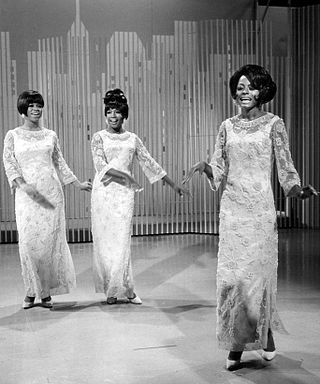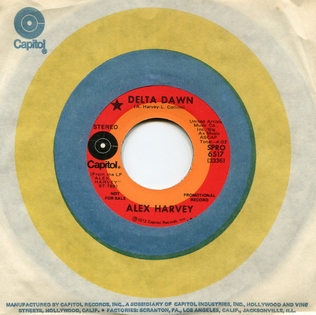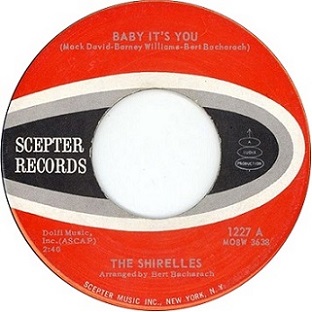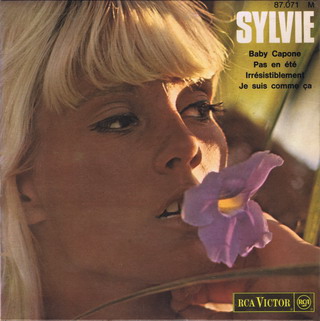
Sylvie Vartan is a Bulgarian-French singer and actress. She is known as one of the most productive and tough-sounding yé-yé artists. Her performances often featured elaborate show-dance choreography, and she made many appearances on French and Italian TV.

"Twist and Shout" is a 1961 song written by Phil Medley and Bert Berns. It was originally recorded by the Top Notes, but it did not become a hit in the record charts until it was reworked by the Isley Brothers in 1962. The song has been covered by several artists, including the Beatles, Salt-N-Pepa, The Astronauts and Chaka Demus & Pliers, who experienced chart success with their versions.

American girl group The Supremes has released 29 studio albums, four live albums, two soundtrack albums, 32 compilation albums, four box sets, 66 singles and three promotional singles. The Supremes are the most successful American group of all time, and the 26th greatest artist of all time on the US Billboard charts; with 12 number-one songs on the Billboard Hot 100 and three number-one albums on the Billboard 200. The Supremes were the first artist to accumulate five consecutive number-one singles on the US Hot 100 and the first female group to top the Billboard 200 albums chart with The Supremes A' Go-Go (1966). In 2017, Billboard ranked The Supremes as the number-one girl group of all time, publishing, 'although there have been many girl group smashes in the decades since the Supremes ruled the Billboard charts, no collective has yet to challenge their, for lack of a better word, supremacy.' In 2019, the UK Official Charts Company placed 7 Supremes songs—"You Can't Hurry Love" (16), "Baby Love" (23), "Stop! In the Name of Love" (56), "Where Did Our Love Go?" (59), "You Keep Me Hangin' On" (78), "Come See About Me" (94) and "Stoned Love" (99)—on The Official Top 100 Motown songs of the Millennium chart, which ranks Motown releases by their all-time UK downloads and streams.

"Delta Dawn" is a song written by musician Larry Collins and country songwriter Alex Harvey. The first notable recording of the song was in 1971 by American singer and actress Bette Midler for her debut album "The Divine Miss M". However it is best known as a 1972 top ten country hit for Tanya Tucker and a 1973 US number one hit for Helen Reddy.

"Baby It's You" is a song written by Burt Bacharach (music), Luther Dixon, and Mack David (lyrics). It was recorded by the Shirelles and the Beatles and was a hit for both. The highest-charting version of "Baby It's You" was by the band Smith, who took the track to No.5 on the US charts in 1969.

"Sloop John B" is a Bahamian folk song from Nassau. A transcription was published in 1916 by Richard Le Gallienne, and Carl Sandburg included a version in his The American Songbag in 1927. There have been many recordings of the song since the early 1950s, with variant titles including "I Want to Go Home" and "Wreck of the John B".

"Bad, Bad Leroy Brown" is an uptempo, strophic story song written by American folk rock singer Jim Croce. Released as part of his 1973 album Life and Times, the song was a No. 1 hit for him, spending two weeks at the top of the Billboard Hot 100 in July 1973. Billboard ranked it as the No. 2 song for 1973.

"Rhythm of the Rain" is a song performed by The Cascades, released in November 1962 in the US and on January 25, 1963 in the UK. It was written by Cascades band member John Claude Gummoe. On March 9, 1963, it rose to number 3 on the Billboard Hot 100, and spent two weeks at number 1 on Billboard's Easy Listening chart. Billboard ranked the record as the number 4 song of 1963.

"Da Doo Ron Ron (When He Walked Me Home)" is a song written by Jeff Barry, Ellie Greenwich and Phil Spector. It first became a popular top five hit single for the American girl group the Crystals in 1963. American teen idol Shaun Cassidy recorded the song in 1977 and his version hit number one on the Billboard Hot 100 chart. There have also been many other cover versions of this song, including one by the songwriters Jeff Barry and Ellie Greenwich themselves, performing as the Raindrops.

"The Game of Love" is a 1964 song by Wayne Fontana and the Mindbenders, first released as a single from the band's titular album in January 1965 in the United Kingdom, followed by the United States one month later as "Game of Love". The song reached Number 2 on the UK Singles chart and Number 1 on the US Billboard Hot 100 that year. The song also spawned multiple successful cover versions, including a version by Ian "Tex Pistol" Morris that was a Number 1 hit in New Zealand in 1987. The song was also adapted into French by Frank Gérald as "Quand tu es là" and was recorded by French pop singer Sylvie Vartan, first in July 1965 as the second single off of her 1966 studio album "Il y a deux filles en moi" that was a hit in French-speaking Belgium, followed by a re-recording in 1990, released as a non-album single, that was a minor hit in France.

John Denver's Greatest Hits Volume 3 is a compilation album by American singer-songwriter John Denver, released in November 1984. "Love Again" and "The Gold and Beyond" were the new singles from this album.

"Oh, Pretty Woman", or simply "Pretty Woman", is a song recorded by Roy Orbison and written by Orbison and Bill Dees. It was released as a single in August 1964 on Monument Records and spent three weeks at number one on the Billboard Hot 100 from September 26, 1964, making it the second and final single by Orbison to reach number one in the United States. It was also Orbison's third single to top the UK Singles Chart, where it spent three weeks at number one.

"Love or Let Me Be Lonely" is a pop song recorded by the soul group The Friends of Distinction and released as a single in early 1970. The song was a multi-format success, peaking in the top 10 of the Billboard Hot 100 at #6 on May 1, 1970 and at #13 on the R&B chart. On the Adult Contemporary singles charts, "Love or Let Me Be Lonely" went to #9. The song is ranked as the 63rd biggest hit of 1970.

"Sad Movies (Make Me Cry)" is a 1961 pop song by the American singer Sue Thompson. The song was written by John D. Loudermilk and was released as Thompson's debut single, from her Hickory Records debut album Meet Sue Thompson. The song also spawned multiple successful cover versions.

"Ride the Lightning" is a song written by South African musician John Kongos and Peter Leroy and originally released by Kongos on 11 April 1975 in the UK and on 11 May 1975 in Germany. While the single never charted, the subsequent French adaption by Pierre Delanoë titled "Qu'est-ce qui fait pleurer les blondes?", performed by French pop singer Sylvie Vartan, would be a hit in France and Belgium the following year.

"Summerlove Sensation" is a song originally recorded by the Bay City Rollers. It was part of their 1974 album Rollin'. In the same year, it was also released as a single five months prior. The single peaked at no. 3 on the UK Singles Chart. It also spawned two successful cover versions in the late 1970s, first a French adaption performed by French pop singer Sylvie Vartan, and a cover by American singer Bobby Vinton that was a minor hit in the charts.

"Par amour, par pitié" is a song by Sylvie Vartan. It was released on an EP in December 1966 and then as the lead single off of her 1967 studio album 2'35 de bonheur.

"Irrésistiblement" ("Irresistibly") is a song by French pop singer Sylvie Vartan, released in July 1968. Co-written by Jean Renard and Georges Aber, the song was released as the lead single off of Vartan's 1968 studio album La Maritza. The song was also adapted into multiple other languages, most notably in Italian as "Irresistibilmente".

"La Maritza" is a song by Sylvie Vartan from her 1968 album Sylvie Vartan. It was also released as an EP and as the second single off of said album.

"Sha La La" is a song written by Robert Mosely and Robert Taylor. The Shirelles released the original version of the song as a single in March 1964 in the US, reaching #15 on the U.S. R&B chart and #69 on the U.S. pop chart. A cover by the British pop group Manfred Mann would follow that October, being the most notable version of the song, reaching Number 3 on the UK Singles Chart and Number 12 on both the U.S. pop chart and the RPM charts in 1965. Around the same time as the release of Manfred Mann's version, the song was adapted into French by Georges Aber and performed by French pop singer Sylvie Vartan, whose version was released as a single in October 1964 and reached Number 14 on the French Belgian charts.




















